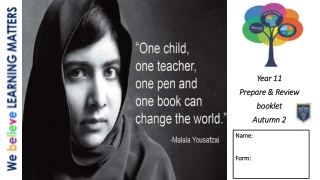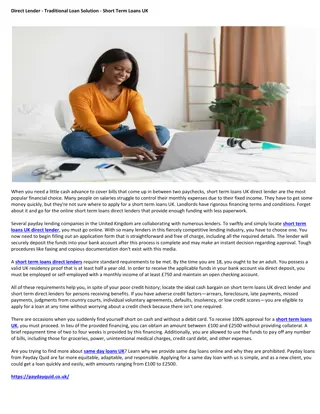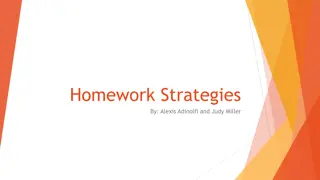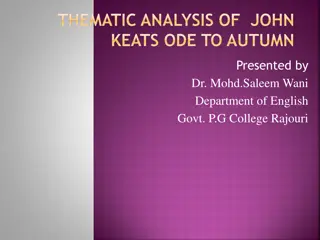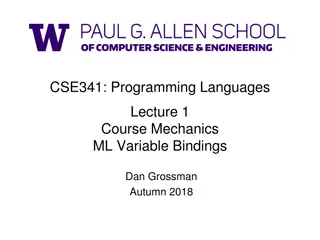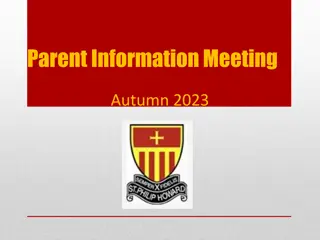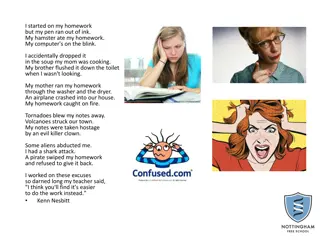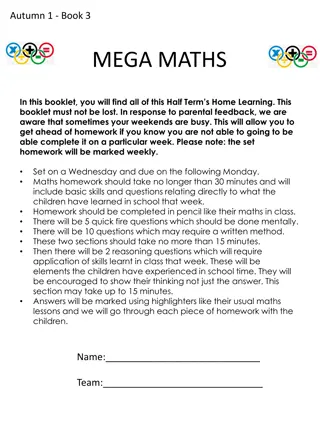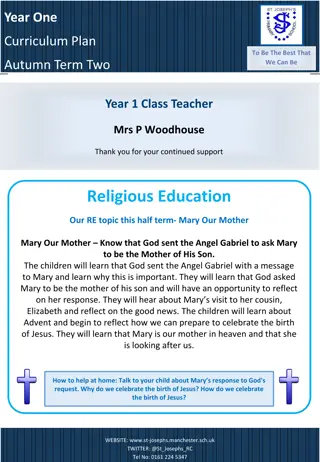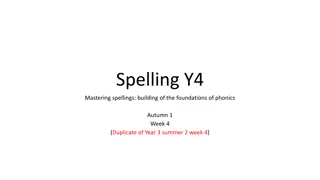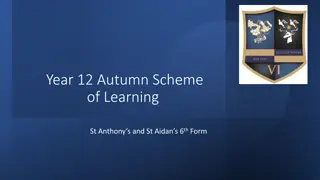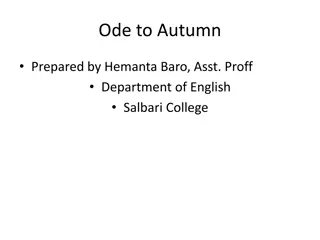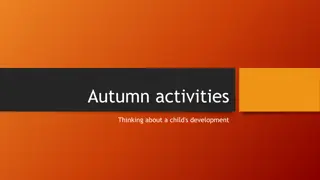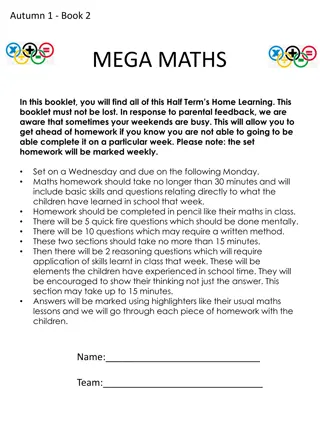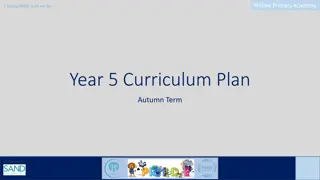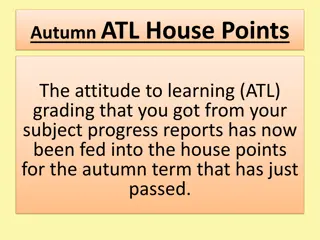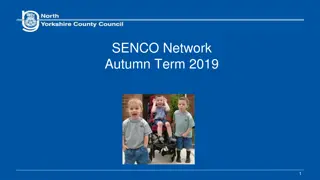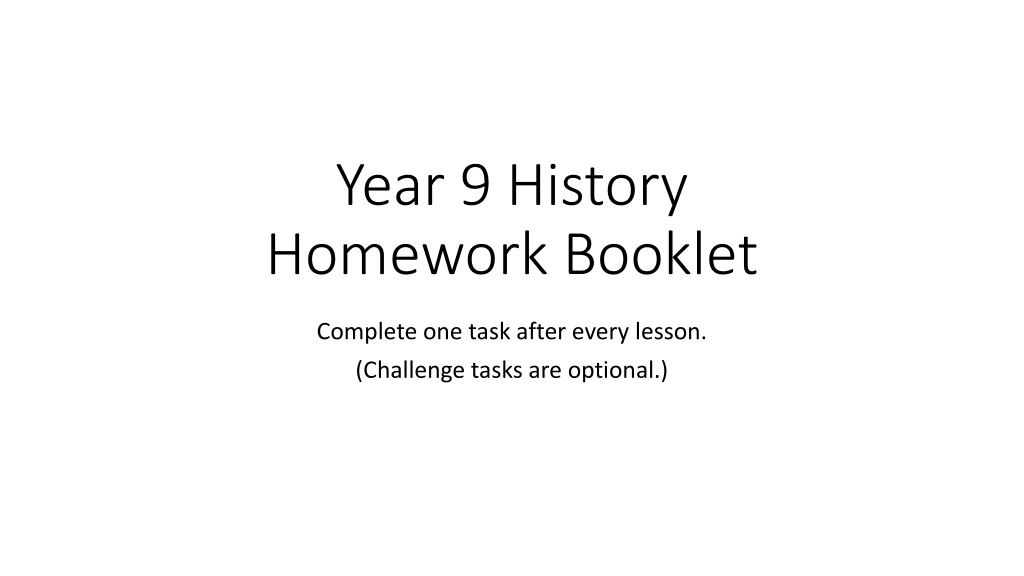
History Homework Tasks for Year 9 Students
Explore engaging history homework tasks for Year 9 students covering topics such as progress in the 20th century, African-American experiences, Nelson Mandela, British Civil Rights movement, and vocabulary learning related to Civil Rights movements. Challenge yourself with optional tasks for a deeper understanding.
Uploaded on | 0 Views
Download Presentation

Please find below an Image/Link to download the presentation.
The content on the website is provided AS IS for your information and personal use only. It may not be sold, licensed, or shared on other websites without obtaining consent from the author. If you encounter any issues during the download, it is possible that the publisher has removed the file from their server.
You are allowed to download the files provided on this website for personal or commercial use, subject to the condition that they are used lawfully. All files are the property of their respective owners.
The content on the website is provided AS IS for your information and personal use only. It may not be sold, licensed, or shared on other websites without obtaining consent from the author.
E N D
Presentation Transcript
Year 9 History Homework Booklet Complete one task after every lesson. (Challenge tasks are optional.)
Autumn Term: Task 1 Over the next few lessons you are going to be considering whether the 20thCentury was a century of progress. In preparation for this please create this table in your books to find out the definitions of the following key words. Make sure that you test yourself on these. Word Definition slavery Challenge: Add a third column to the table, entitled Example . Add an example for each word. (You may use your iPAD to find them.) For example: An example of a nineteenth-century abolitionist is William Wilberforce. abolitionist emancipation segregation boycott suffrage enfranchise discrimination migrant
Autumn Term: Task 2 Written Task Practice paragraph: Explain how far the lives of African-Americans have changed from slavery to the 1960s-70s. Write ONE chunky PEE paragraph. Remember to explain the nature, rate and extent of change. (What actually changed? How fast did it change? How much did it change?) Challenge: What problems still existed by the 1970s? Write another PEE paragraph.
Autumn Term: Task 3 Meanwhile, Elsewhere Similar to the segregation in America, racial segregation also existed in South Africa between 1948 and the 1990s. It was known as Apartheid. Nelson Mandela fought to end Apartheid in South Africa. Watch the following video about Nelson Mandela (or research Nelson Mandela online): https://www.bbc.co.uk/teach/class-clips-video/history-ks3-nelson-mandela-south-africas-first- black-president/zd2nmfr Create a fact file about Nelson Mandela. This should be a maximum of one page long. It should include key information about who Nelson Mandela was, what he fought for and what he achieved. Challenge: Having learnt all about Nelson Mandela what surprisedyou most? And what shocked you most? Explain.
Autumn Term: Task 4 Revising the British Civil Rights movement https://www.bbc.co.uk/programmes/articles/43hgqsYgTXK8cBkFhzpLK yB/three-reasons-why-the-civil-rights-movement-is-part-of-british- history Read the information on the website above (you might also watch the video) and then create three flashcards one on the Bristol Bus Boycott, one on The Trial of the Mangrove 9, one on the New Cross Fire. Think about why each event is important how did it bring about a change?
Autumn Term: Task 5 Vocabulary Learning 1. Select THREE change words from this spider diagram. 2. Explain how a Civil Rights movement (US/UK/Women) we have studied fits with each word. For example: Although women now have more equality, such as the equal right to vote, the change is incomplete for them as they do not always receive equal pay to men. Challenge: Go back to your three change words from the task above. Now, compare two different movements against each word. For example, between the fight for African-American Civil Rights and LGBT rights, which is more dramatic? (Think about all the different criteria that go into making something dramatic.)
Autumn Term: Task 6 Autumn Term: Task 6 Revise for your final essay: To what extent has the 20th century witnessed dramatic progress? a) Use this Quizlet to revise key events and dates: https://quizlet.com/_df5jse?x=1jqt&i=t6bni b) Make sure you have a flashcard on each group you are planning to discuss (3 in total out of African-Americans, Black British, British women & LGBTQ+) On your flashcard, include key evidence of change and key evidence of continuity (problems that still exist).
Autumn Term: Task 7 Autumn Term: Task 7 did technological progress mean progress for humanity? progress mean progress for humanity? did technological Pick a new invention from the 20th century you can use this website to help if you are not sure - https://www.thoughtco.com/20th-century-timeline-1992486 Come up with: Arguments that this new invention would lead to progress for humanity Arguments that this new invention would cause problems for humanity
Autumn Term: Task 8 Soon you are going to be looking at why World War One started in 1918. In preparation for this please create this table in your books to find out the definitions of the following key words. Make sure that you test yourself on these. Word Definition Militarism Challenge: Complete some extra research on Kaiser Alliance Nationalism Wilhelm II: When was he in power? Key events during his reign? How did his reign end? What did he do when his reign ended? Allies Imperialism Archduke Colony Kaiser
Autumn: Task 9 Recently we ve been looking at the causes of WW1. Similarly, we looked at causes leading to an event happening in Year 8 when you studied the Civil War https://www.bbc.co.uk/bitesize/topics/zk4cwmn/articles/zxxgg7h Use the information on bitesize on the Civil War to refresh your memory on this event and then answer the questions below: 1) How did money lead to the Civil War? 2) How did power lead to the Civil War? 3) How did religion lead to the Civil War? 4) What was the result of the Civil War? Challenge: Find extra details to add to your answers using the link below. You will need to scroll down to What caused the wars. https://www.english- heritage.org.uk/learn/histories/t he-english-civil-wars-history-and- stories/the-english-civil-wars/
Autumn Term: Task 10 Pick one of the collections of photos or videos from the Imperial War Museum Website below. What can you learn about the First World War from the photos/video? Create a spider diagram of ideas. https://www.iwm.org.uk/learning/resources/the-western-front
Autumn Term: Task 11 Autumn Term: Task 11 We have learned about different parts of the First World War over the last few lessons. If you were a curator if you were creating your own museum exhibition on the First World War, what would you shine a light on what would you focus on? Explain why you think that part of the war is so significant why is it worth focusing on?
Autumn Term: Task 12 We are studying dictators next. a) Can you find a definition for the word dictator? b) Look at the examples of dictators. Which countries did they rule? Add them to the map or write next to them the countries they controlled. Challenge: When were they in power? Do you notice any patterns? - Adolf Hitler - Benito Mussolini - Vladimir Lenin - Joseph Stalin - Mao Zedong - Idi Amin - Fidel Castro - Pol Pot Challenge: What do you notice about the map? (Are there any trends or patterns? Are there any surprises? Can you think of any reasons for these trends/patterns or surprises?)

